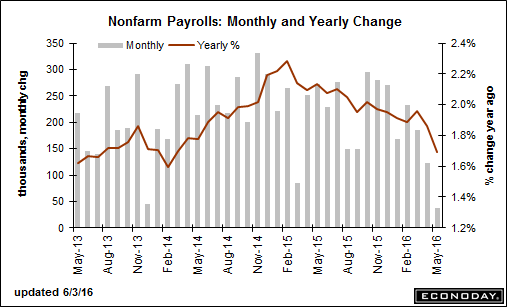Why the jobs slowdown is a big deal
Many were rattled by Friday's surprisingly weak jobs report because the labor market has, for months, been a source of resolute strength.
The May payroll report came in at 38,000 new jobs, well below the consensus expectation for a 160,000 gain. Making matters worse, March and April were revised lower by a combined 59,000. The result was the weakest month of job creation in five years.
This is a big deal for a few reasons.
For one, it has dramatically lowered rate hike expectations from the Federal Reserve. The futures market now assigns only better-than-even odds for a hike in December as policymakers are likely to continue their wait-and-see approach. In comments on Friday, Fed Governor Lael Brainard said it was prudent to wait for additional economic data to build further confidence about the economy's path.
Moves in the equity, fixed-income, commodities and currencies markets on Friday suggest traders were surprised by the severity of the data disappointment after weeks of aggressively hawkish testimony by Fed policymakers that had talked up the chances of a rate hike in June or July. The dollar dropped, Treasury bonds rallied, stocks sold off initially and precious metals surged.
The jobs report also continues a pattern of oddly mixed economic data. For instance, the government's report on retail sales was strong, but earnings reports from retailers have been extremely weak. Also odd: The government highlighted the drop in the unemployment rate before reporting the weak payroll number, a change of standard practice as the civil servants tried to gloss up numbers they knew were going to be poorly received.
Consider that the jobless rate dropped to a new post-recession low of 4.7 percent (from 5 percent), which is normally a good thing. But it was driven by 458,000 people leaving the workforce. Yet the tightening of the labor market is pushing wage inflation higher, with average hourly earnings up 0.2 percent in May, in line with estimates, which is a good thing.
Some one-off factors weighed on the numbers, such as the Verizon (VZ) strike and some possible seasonal payback after strong job growth over the winter. Yet the consensus is that the Fed will be hard pressed to move forward with rate hikes later this month or even in July with these doubts hanging in the air.
Analysts at Bank of America Merrill Lynch reiterated their expectation for rate-hike action in September at the earliest as market odds of a June hike drop to less than 5 percent.
Economists at J.P. Morgan have warned their clients that their model of U.S. recession risk over the next 12 months has increased from 30 percent on May 5 to 34 percent last week and to 36 percent now. The increased risk has been driven by disappointments in the Dallas Fed manufacturing activity report, the ISM nonmanufacturing report and the Conference Board's measure of consumer confidence tempered by improvements in the ISM manufacturing report and auto sales.
Investors will again be listening intently to a speech by Fed Chair Janet Yellen on Monday for hints as to how she and her cohorts are viewing the murky outlook. Any hint of hawkishness, such as a noting possible one-off factors depressing the jobs numbers, could end the stocks market's standoff above the Dow Jones industrials' 50-day moving average. That's a level it has tested falling through during the last four consecutive trading sessions to cap a three-year-long sideways crawl near 18,000.
